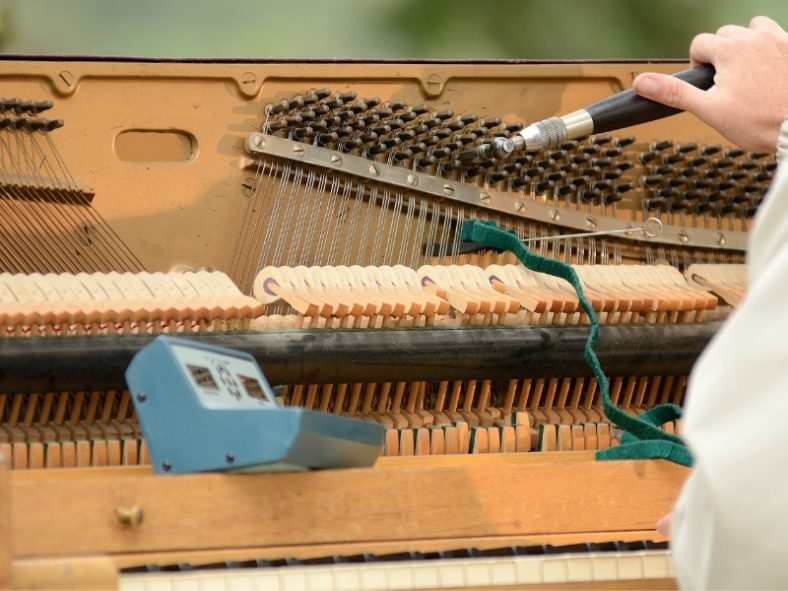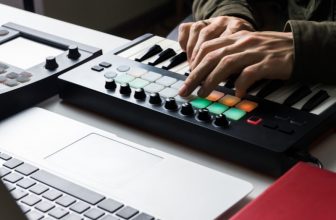How Much Does It Cost To Tune A Piano?

Tuning a piano costs around $100 to $300. Standard tuning services in the United States cost approximately $120 to $160, but some entry-level piano technicians should be able to work for a little less. Experienced piano tuners may ask for as much as $300 per session.
Tuning a piano is not only important for playing music, but it’s also a vital part of piano maintenance. When neglected, piano strings tend to lose tension. Over time, non-tuned pianos may need to be restrung which is much more costly than tuning a piano.
While piano owners should be able to tune their pianos for $300 or less, many factors may drive prices up. Below, I’ll be taking a look at the main aspects that influence a piano technician’s job while also answering a series of frequently asked questions on the subject of piano tuning.
Contents
- The essentials of Tuning a Piano
- Additional costs of Piano Tuning Services
- How often should a Piano be tuned?
- Can an old Piano be tuned?
- How long does it take to tune a Piano?
- What makes a Piano go Out of Tune?
- How much does it cost to Restring a Piano?
- Is being a Piano Tuner a good career?
- How can you tell if a Piano needs to be Tuned?
- Conclusion
The essentials of Tuning a Piano
Tuning a piano is not an easy job. It requires a set of special tools, a great ear, great knowledge about the instrument, and lots of experience. It’s not something you can do with a phone app, like tuning a guitar. If you try to tune a piano without knowing exactly what you’re doing, you may risk doing a bad job (at the very least) and permanently damaging the instrument (at the very worst).
Understanding the essentials of tuning a piano, however, is not that hard. A standard piano tuning service involves fine-tuning the strings of the instrument so they match a tuning system known as equal temperament. Equal temperament is a set of specific frequencies that allows you to correctly play songs and, most importantly, make sure your piano is in-tune with other instruments.
Equal temperament is a protocol that ensures a smooth working relationship between musicians. If every instrument was fine-tuned differently, it’d be very difficult to jam with friends or perform live with other musicians. In equal temperament, A is tuned to 440 Hz.
Additional costs of Piano Tuning Services
Several technical and economical factors come into play when tuning a piano and may affect the price of standard piano tuning services. These are some of the most significant:
- Pitch raises: When a piano is drastically out of tune, piano technicians will have to raise the pitch of the instrument before tuning the strings. This means they will require an additional pre-tuning session. Considering most piano tuners get paid hourly, this can significantly increase the cost of tuning a piano. If your piano is relatively new, well-maintained, and stored in a dry place, it will most likely not require pitch raises.
- Rough-tuning: While the standard process of tuning a piano is called fine-tuning, some pianos will also need an additional rough-tuning session. Again, this may increase the cost of tuning the instrument. Rough-tuning is needed when the pitches of a piano string are unaligned between themselves. This means that the piano technician will need to restore the entire tonal balance of the piano.
- Piano repairing: Old and neglected pianos will often need more than a standard tuning session to work properly. Piano repairing costs vary extensively. It involves tasks as disparate as fixing structural damage, changing the strings, replacing the hammers, or cleaning the instrument. Depending on the condition of the piano, repairing services should cost anywhere between $750 and close to $10K.
- Distance traveled: Getting a piano tuned isn’t like going to the grocery shop. Depending on where you live, you may have to pay extra for standard tuning services to cover distance-related costs such as gas and the time the technician spent traveling. These shouldn’t add too much to the final cost but must be considered anyway, especially if you reside in a particularly remote area.
- Do you need to tip the piano tuner? Tipping a piano tuner isn’t mandatory and many people don’t. But if you hired a piano tuner and he or she did a great job, tipping is a good way of showing some appreciation.
How often should a Piano be tuned?
Ideally, a piano should be tuned twice a year. If your piano is relatively new, getting the services of a piano tuner once a year should be enough. Yearly fine-tuning sessions are great for conserving the instrument and maintaining string tension.
If you’re a professional pianist, you should tune your piano before every live performance or recording session.
Can an old Piano be tuned?
Pianos can last for a long time if they’re well maintained. However, if you want to tune a piano that’s been sitting in a room for decades without being cleaned, tuned, and repaired, you should need as many as four standard tuning sessions, assuming there are no pressing structural issues that need to be addressed first.
Neglected pianos with up to 20 years are still worthy of the services of a piano tuner, even though you’ll have to cover the cost of multiple sessions. Pianos with 50 or more years, though, are considered “vintage” and cannot be saved unless they’re entirely restored.
How long does it take to tune a Piano?
For a standard tuning session, piano services take a minimum of one hour and a maximum of four hours. It depends on the experience of the piano technician. Knowledgeable piano tuners should be able to fine-tune the instrument in one to 1.5 hours. Entry-level technicians may take as much as four hours.
This may help to explain why experienced piano tuners charge higher hourly rates than inexperienced piano tuners.
What makes a Piano go Out of Tune?
Even the most well-preserved pianos go out of tune. That’s just gravity! However, temperature fluctuations and humidity drastically affect the structure of the instrument. To ensure your piano stays fine-tuned for as long as possible, you should store it in a dry room.
How much does it cost to Restring a Piano?
Restringing a piano is a much more complicated and costly process than tuning a piano. It involves taking all the strings out and replacing them with new ones. A complete set of piano strings alone costs as little as $250 and as much as $400. A complete restringing job costs a minimum of $1K and as much as $4K. For high-quality pianos or particularly delicate tasks, restringing a piano can cost more than $10K.
Is being a Piano Tuner a good career?
There are currently less than 9,000 piano tuners in the United States, and the country will need an estimated 4,800 piano tuners over the next decade. This means that piano technicians face little competition.
As we’ve seen so far, piano tuners can get up to $300 per standard tuning session (depending on their experience and reputation), which means you can calculate the earnings of a piano tuner based on the time they take to tune a piano and the fee they ask for it.
Is there sufficient demand for piano tuners, though? It’s a much harder question. While many piano owners tend to neglect their instruments, many professional pianists require piano-tuning services routinely and there are few people in the United States able to provide such a service. This means that the demand for piano technicians is most likely high.
How can you tell if a Piano needs to be Tuned?
If you don’t play the piano, you can press one of the piano keys and try to hear a wavering sound. If you can pick up any kind of pitch distortion (as if the note of the piano is slowly changing, becoming lower) your piano needs urgent tuning. Yearly piano-tuning sessions are recommended.
Conclusion
Tuning a piano is important for professional pianists to ensure the quality of their live performances or recordings. It is recommended that pianos be tuned at least once a year, and more frequently if the piano is located in an area with drastic temperature or humidity changes. Restringing a piano is a more complicated and costly process than tuning, and should only be done when necessary. Being a piano tuner is a good career choice, as there is little competition in the field and high demand for services.





